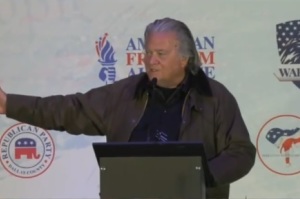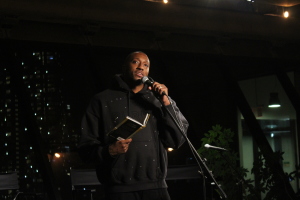Trump, conservatives and civility: What is the French-ism/Ahmari-ism debate really about?

Ever since President Donald Trump broke old conservatism, conservatives are debating what the new conservatism should be, as they try to piece it back together.
The most recent spat revolves around a May 29 Sohrab Ahmari, New York Post op-ed editor, article in First Things, "Against David Frenchism."
Here are some of the highlights of that debate. Follow the links if you want to dig deeper.
On March 31, First Things published a manifesto, "Against the Dead Consensus," co-signed by a number of religious conservatives.
"There is no returning to the pre-Trump conservative consensus that collapsed in 2016. Any attempt to revive the failed conservative consensus that preceded Trump would be misguided and harmful to the right," the manifesto stated.
Signers included Ahmari, Patrick Deneen, Rod Dreher, Pascal-Emmanuel Gobry, Mark Regnerus, and Matthew Schmitz.
In "Against David French-ism," Ahmari said that, speaking only for himself and not the other signers, the manifesto was against the sort of conservatism represented by David French, a conservative writer for National Review and former lawyer with Alliance Defending Freedom who is well known for his opposition to Trump.
"French-ism," he wrote, "is more a persuasion or a sensibility than a movement with clear tenets."
This sensibility includes an "earnest and insistently polite quality," Ahmari said, that is unable to win political battles against the progressive forces seeking to exclude religious conservatives from the public square. Religious conservatives have "won discrete victories," he argued, but overall, they are losing the culture war.
French-ism is partly to blame, Ahmari wrote, because French will fight for the individual liberty of those who seek to make America a place where religious conservatives like him are forced underground.
"The more that conservative liberals like French insist on autonomy, the more they strengthen the bullies’ position," Ahmari wrote.
French-ism's appeal to persuasion won't work, Ahmari insisted, because "they won't listen."
Ahmari also praised Trump's anti-French-ism: "With a kind of animal instinct, Trump understood what was missing from mainstream (more or less French-ian) conservatism."
French responded on May 30 to Ahmari with, "What Sohrab Ahmari Gets Wrong."
Ahmari's argument is based upon a dual misrepresentation of himself and Trump, French wrote. He's not opposed to politically fighting liberals, for instance, and has done so, and won, in court cases when he worked for ADF. Plus, Trump isn't the shrewd political operative Ahmari makes him out to be. "Donald Trump wouldn’t even fully grasp what this paragraph means, much less recognize it as a governing philosophy," he wrote of Ahmari's take on Trump.
French defined his own philosophy as, "zealous defense of the classical-liberal order (with a special emphasis on civil liberties) and zealous advocacy of fundamentally Christian and Burkean conservative principles. It’s not one or the other. It’s both. It’s the formulation that renders the government primarily responsible for safeguarding liberty, and the people primarily responsible for exercising that liberty for virtuous purposes."
Conservatives shouldn't adopt the tactics of their political foes, French continued, and seek to banish them from the public square. Instead, "we can recommit to our shared citizenship and preserve a space for all American voices, even as we compete against those voices in politics and the marketplace of ideas."
Amahri is correct, French added, that he doesn't see politics as war. He once did, but after serving his country in an actual war, his views changed.
Ahmari thanked French for his response, adding that French failed to rebut his central claim that "autonomistic liberalism, by its inner logic, won’t tolerate Christianity in the public square."
Many of the critics have pointed out that Ahmari offers a critique, but not an alternative. And since, by Ahmari's own admission, the critique is about "sensibilities," rather than specific policies or tactics, holding onto what exactly the debate is about has proven slippery. Ahmari has pushed back, however, against critics who said he's opposed to civility, noting that his position is about properly understanding the enemy.
The responses to this debate are too numerous to mention them all, but here are a few notable ones.
R.R. Reno, editor of First Things, wrote on May 31 that our liberal tradition is not enough. Conservatives should agree that "something else is needed," even if we can't pinpoint precisely the boundaries of that something else.
"We need to find our way toward the something else that’s needed in twenty-first-century America. This does not mean jettisoning everything now bundled under the heading of liberalism or its close cousin, civility. But it does mean knowing that they cannot guide us forward," he wrote.
Alan Jacobs, professor of humanities at Baylor University, wrote in a June 3 article for The Atlantic that French and Ahmari both get something right.
Ahmari is correct about today's liberals: "Today’s secular left has no intention of playing fair, and if Christians and conservatives — if people who follow 'David French–ism' — insist on playing by the discarded rules, they’re just setting themselves to be played for suckers."
But French's defense of civic virtues is aligned with his commitment to follow Christ: "... charity, and the civility and decency that accompany charity and have so consistently been manifested by [French] are what we are commanded to do."
"Ahmari thinks that 'civility and decency are secondary values,'" he added, "but even if that is true, they remain values, and Ahmari is not warranted in discarding them so flagrantly."
Ross Douthat, conservative columnist for The New York Times, believes the debate is really about remaking conservatism, with French representing the old-style Reagan alliance of religious conservatives, economic non-interventionists and foreign policy interventionists, and Ahmari representing the fight for a new populist conservatism.
While Douthat has sympathies with Ahmari's aims, he thinks Ahmari-ism failed in tying its fortunes to Trump, who is destined to sink the Republican Party and the Ahmari-ites with him. Trump is the antithesis of what religious conservatives claim to be fighting for. Plus, as a practical matter, a populist revolution that excludes non-whites won't have the numbers to maintain political power, he pointed out.
"There are voters out there that a moralistic and populist conservative right might win but a flagrantly hypocritical and ethnonationalist conservatism cannot. And so far post-fusionist conservatism has devoted more energy to devising clever anti-anti-Trump arguments than to addressing head-on an obvious question like, How are you going to persuade more African-American Christians to support what seems like a white-chauvinist formation?" Douthat wrote.
In a June 3 article for National Review, Jim Geraghty argues that the big problem with conservatism today isn't French, it's the hucksters who have swindled conservatives in order to enrich themselves.
Many of the large conservative organizations active today have raised millions of dollars and spent a mere pittance to help Republicans win.
One group, for example, raised $18.5 million in the previous election cycle, but only spent $425,442 on political activity.
"What has grassroots donor money going to scam PACs cost the conservative cause?" he wrote. "Perhaps GOP control of the U.S. House of Representatives, and now at least two years of Trump’s presidency will be spent on defense instead of attempting to turn conservative policy ideas into federal law.
"But hey, tell me again how David French’s 'civility and decency' are what’s holding the conservative movement back!"
If you're still hungry for more, check out Joe Carter's reading list at Acton Institute.



























